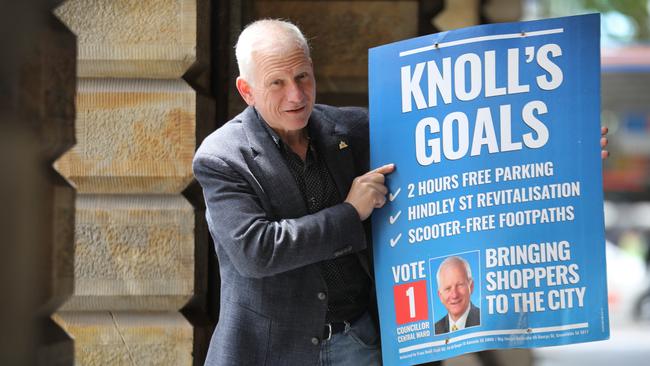Eight SA councils to go back to the polls are failing to find enough candidates
Amid a massive drop in votes, eight council go straight back to the polls next year after failing to attract enough candidates. Is it time for mergers?
SA News
Don't miss out on the headlines from SA News. Followed categories will be added to My News.
Eight council areas will head back to the polls in the new year after failing to receive enough councillor or mayoral nominations, prompting experts to call for mergers.
Meanwhile, the Electoral Commission of SA website shows 90,000 fewer people have voted in the local government elections, compared with the same time during the 2018 campaign.
Commissioner Mick Sherry said the number of returned ballots “aligns with our expectations” and a large number were expected next week due to an extra week of voting.
Voter return rates for regional areas – some as high as 50 per cent – were traditionally greater than suburban councils because there are fewer residents in those council areas.
However, eight regional councils have failed to attract enough candidates, including Tumby Bay and Southern Mallee councils which have four and five vacancies, respectively.
As a result, the councils must hold supplementary elections, paid for by ratepayers.
Flinders University Adjunct Professor Haydon Manning supported the investigation of council amalgamations, given the 16 vacancies for councillors or mayors across the state.
“It does raise into focus whether some of the smaller councils are really viable if you can’t find sufficient numbers of people to contest or fill vacancies,” Prof Manning said.
“In the case of Tumby Bay it’s right next door to a much more vibrant and bigger council (of Port Lincoln) which has a contested mayoral election and for its 12 vacancies.”
Prof Manning said even the possibility of shared services, such as technology and information, should be considered by smaller councils.
The state government is using the elections to ask ratepayers of Mount Gambier and Grant District councils to vote on a plebiscite to investigate a possible amalgamation.
Premier Peter Malinauskas announced the South-East council merger ballot in September as a test case and told The Advertiser the amalgamation issue was “repeatedly raised” on his visits there.
Mr Malinauskas was asked whether he believed there was a need to review the future of smaller councils, given that eight had failed to attract enough candidates.
“Council amalgamations can be beneficial in some circumstances, but they will only ever work where there is genuine community support,” he said.
The Local Government Association of SA has previously said it was against forced amalgamations and they must be community-driven and supported by both councils involved.
State government-driven mergers, such as in Queensland and NSW, have proven to be contentious and an alternative has been the collaboration of shared resources and services.
The last SA council mergers in 1997 included Hindmarsh, Woodville, Henley and Grange councils combining to form Charles Sturt, along with Norwood, Payneham and St Peters councils merging.
A blueprint, commissioned by the then-Liberal government, that instigated the mergers forecast up to $150m in savings for ratepayers, however work by McKinley Douglas in 2006 found it saved only $19m.
All ballots to be considered in the local government elections must be received by the Electoral Commission or dropped off at your local council office by 5pm on Thursday.
‘Foolish’ Corflute ban has hurt voter turnout
Banning corflutes on public roads during the local government elections was a “foolish decision” that has affected voter participation, a political analyst says.
Flinders University Adjunct Professor Haydon Manning said the low voter turnout – currently at 25 per cent statewide – was a “consequence of banning election posters”.
“It’s profoundly disappointing, but not surprising that fewer people have participated in something as important as local government elections,” Prof Manning said.
“Voter turnout is always a problem, so everything needs to be done to encourage voting and banning corflutes outright was a foolish decision.
“They’re a reminder elections are actually happening and it’s entirely reasonable it’s a key factor why people haven’t voted.”

Under changes to the Local Government Act last year, posters made from plastic or corflute were banned from public roads, including traffic signs and vegetation.
In September, Prof Manning warned the ban would be to the detriment of voters who failed to return their ballot papers as it was not compulsory to vote.
He said candidates should instead be limited in the number of corflutes they can erect.
An ECSA research report in February found communications that merely remind electors to vote have “nil or negligible effects” on voter turnout, instead “stronger social pressure” was more effective at raising turnouts.
Election posters made from other materials can still be displayed in accordance with an authorisation, permit or by-law in the relevant council area.
Adelaide City Council councillor and candidate Franz Knoll has erected cardboard posters around the Central Ward – which are allowed on poles no lower than 2m or higher than 3m.
“It’s an affordable way for people in the community to stand in the elections to deliver a message and also reminds people to vote,” Mr Knoll said.
His posters have colourful slogans such as: ‘Knoll K’Noath’ and ‘Knoll Makes Wurst Best’.
“People that know me say they look at it and say ‘thank god it’s a bit funny’ and it puts a smile on their face,” Mr Knoll said. “Normal signs are like wallpaper. You want people to see you.”




